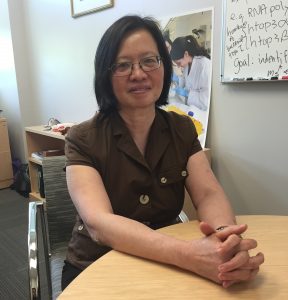Sudyen Navarrete/ Staff Writer
Prostate cancer has one of the highest death rates in the United States. According to the American Cancer Society one in seven men are diagnosed with prostate cancer.
University researchers are on a mission to find a way to battle the deadly disease.
“Mortality rates for the castrated mortality system are very high,” said Yuk-Ching Tse Dinh, director at the Biomolecular Science Institute at the University and professor in the Department of Chemistry and Biochemistry. She added that there was a real need for this kind of treatment that can be offered to patients in need of it.

Ph.D Yuk-Ching Tse-Dinh is a Chemistry and Biochemistry professor and director at the Biomolecular Science Institute at FIU.
Tse Dinh, biochemist Yuan Lui and cell biologist Irina Agoulnik, from the Herbert Wertheim College of Medicine, are working a scientific method to corrupt and terminate the cancer cells that cause prostate cancer.
“The research is a new approach to finding a noble therapy to treat prostate cancer,” said Dinh.
The research is focused on castration resistant prostate cancer, meaning, men who are castrated will benefit from the treatment.
According to Dinh, the team is working on developing an easy system that will allow them to determine which chemicals are the ones that can stop the cancer cell growth.
“We can identify chemical entities that will be effective in preventing the cancer from repairing the action of the anti-cancer drugs,” Dinh said.
In other terms, a human’s DNA is the best place to experiment.
The teams of scientists have come up with strategies that are yet to be tested, but they seem optimistic.
“One of the [most] important strategies is to intentionally introduce the DNA damage in a massive amount,” said Liu. “That way, we kill [the cancer cells] by damaging their DNA so severely that they cannot survive.”
However, the cancer cells can build a stronger resistance to prevent their destruction.
“They won’t stand still, they will fight back,” said Liu.
Besides being a researcher, Liu is also a professor teaching biochemistry at the University. She’s an expert in DNA damage repair.
“I’m responsible for creating and developing a method to measure the ability of a cancer cell and how to repair the DNA damage,” she said.
Some of the procedures after developing a method for prostate cancer are to test out the method into cells.
“Once we develop a method, we’re going to test it with a prostate cancer cell,” said Liu. “Tse Dinh’s group will be in charge of screening the new drugs and Agoulnik will photo test the new drugs.”
The examination process will begin with cells and will continue with animal testing. If all goes well, they hope to incorporate patient clinical trials.
According to Dinh, this treatment can also benefit other types of cancers such as glioblastoma, which is a type of brain tumor.
“We think it will work for glioblastoma because that’s also a case where there’s not a lot of effective treatments,” she said.
Liu believes that it can benefit breast cancer, colon cancer and leukemia also.
Nevertheless, the highly developed research is not well known around the University’s grounds, judging from the fact that students around campus were not aware that this research was going on.
Despite this, students were surprised after finding out.
“It’s great to know they’re doing that research,” said Stefany Barzaga, a junior majoring in nutrition. “It’s important to find treatment or a prevention for future men getting prostate cancer.”
Another student, Jouliana Belizaire, a junior majoring in health care administration, said that she feels the same way as Barzaga.
“I feel excited about this,” she said. “It won’t be easy to find a cure or treatment but it will be a great discovery if they get to find the treatment.”
The research received a $50,000 grant from The Community Foundation of Broward.
“It has supported us,” said Liu. “That way, we can put effort from different groups of research societies that have students that would like to participate.”
The research is still at an early stage and can take up to two years to complete.
Until clinical trials bring accurate results, the research will come to a stop or continue for another approach.





Be the first to comment on "Professors of the College of Medicine research treatment for prostate cancer"